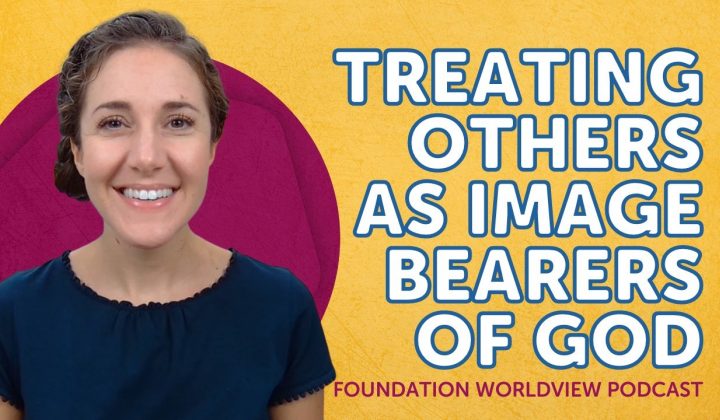Learn more about the journey that led to us equipping kids to carefully evaluate every idea they encounter.
Meet members of our team who have contributed to curriculum development.
Hear from real users of the Foundation Curriculum.
Learn what we believe about God, Jesus, Scripture, and more.
Correcting Errors and Explaining Complex Concepts to Children
Today's question says, "I previously had the false belief that we were spirits in heaven before being conceived. I have been telling my three-year-old this whenever he asked where he was when I was a little girl. How do I correct my error with my son? How do I explain non-existence to a toddler?"
Transcript
Note: The following is an auto-transcript of the podcast recording.
Hello friends and welcome to another episode of the Foundation Worldview Podcast where we seek to answer your questions so that you can equip the children that God has placed in your care to carefully evaluate every idea they encounter and understand the truth of the biblical worldview. I'm your host, Elizabeth Urbanowicz and I'm thrilled that you've joined me for another episode today. Today's question says, "I previously had the false belief that we were spirits in heaven before being conceived. I have been telling my three-year-old this whenever he asked where he was when I was a little girl. How do I correct my error with my son? How do I explain non-existence to a toddler?" I love this question. I was so excited when it came in because I think it's important to talk through how do we correct errors that we make when teaching our children? And then I also love talking. I actually love, love, love, love, love talking about how do we explain more complex, philosophical and theological concepts with our little ones? So we're going to dive down deep into these two things today.
But before we do that, I would ask that if you have found the content of this podcast beneficial that you would like and subscribe to make sure that you never miss any future episodes and would also ask that you would invest time writing a review so that more people can find this content and we can equip as many adults as possible to get the kids in their care to carefully evaluate every idea that they encounter.
Now, when we think through, how do we correct an error that we make in teaching our children, that is so important to think through because guess what? We are all going to make errors when teaching our children simply because we are not infallible, we are fallible, and we are consistently hopefully learning and growing and coming to a greater understanding of what is true.
So we need to make sure that anytime we learn something and we realize, "oh my goodness, what I previously taught my kids was wrong," we need to not be scared to go to them and to admit our error. We need to go to them and say, "Hey, do you remember a while ago and we talked about this or when I told you this? Well, I have learned and studied more and this is what I found as I've continued to learn and study. So what I told you before was not true. I'm so sorry. I did not purposely lie to you. I thought that that was true. But as I investigated the evidence more, I discovered that it was not true." And this is so important that we do this with our children. It first of all models humility, which is so important. We want to develop in ourselves and in our children a heart of humility, and it also models for them a desire to continue learning and growing, and that's what we should want for ourselves and what we want for our children. So it's really important that we be modeling these things before them.
Now, with regards specifically to this question, how do we explain non-existence to a toddler? This for some can seem like, oh, this is a really complex concept, but you know what? Even little ones are ready to understand complex concepts as long as we explain them to them in a way that aligns with how God has designed them to learn. And so one thing that we need to do when we're teaching complex concepts, we need to make sure that we break them down into bite-size, little truths, and that we get them involved in hands-on activities that can help them understand these concepts.
I know one thing I particularly liked about this question, how do we explain where our children were before they were born? The fact that before conception they did not exist? One thing I really love about this is what we need to do is actually teach them certain attributes of God because by teaching them attributes of God, they're going to see how vastly different God is from us.
So we're going to talk about teaching them certain incommunicable attributes of God or attributes that God alone has. And actually what I'm going to do is I'm going to walk you through the first three attributes of God that we at Foundation Worldview cover in our Attributes of God curriculum. So if you've taken your kids through this curriculum, you already know these attributes of God and your kids should know them, but I'm going to just model for everyone how we can teach our kids these attributes of God and then help them understand where they were before they were conceived.
So the first attribute of God that we should cover with them to help them understand this concept that they did not exist before they were conceived is that God is self existent. God has no cause. I'm going to say that again. God is self existent. God has no cause. And so a great activity that you can do with your little ones that we do in Foundation Attributes of God curriculum is point to different objects around the house and say, "what caused this?" If you point to the sofa, you can say, "okay, what caused this?" Well, someone designed this sofa and then the machines, they use machines in the factory to construct this sofa. So the sofa had a designer, this sofa had a cause. You hold up a glass of water and say, "okay, this glass, what caused this glass?" Well, someone had the idea to design a glass and then in the glass factory they took that idea and they created a glass. And then talk about how everything you see in the world around you has a cause.
And for the person who wrote in this question, that's when you can talk to your son and say, "Hmm, do you have a cause? Yeah, you do. You do have a cause. That you know what? There needed to be a little bit of mommy and a little bit of daddy to come together to make you." Now, if you've already had a conversation with your child or children about God's good design for sex and sexuality, which we do recommend you start having at the age of three, you can actually use the technical terms. "Remember how we talked about how it takes a mommy's egg and a daddy's sperm to come together to make a baby" and say, "that is what causes a baby." And say, "you know what? Before that, cause you didn't exist, there was no you for any of us, before the sperm and the egg came together, there was no us just like before this person created this glass, this glass did not exist. Or before the person created this sofa, this sofa didn't exist."
Then we can say, "now is it the same with God? Did someone or something cause God to exist?" And then we can take our kids right to Scripture. Exodus chapter 3 verses 14. This is when God is speaking to Moses and that burning bush, it says, "God said to Moses, I am who I am." And we can say, "does this say that somebody caused God? No, God is saying, I am who I am. God has no cause. God is self existent." And we can teach that to our little ones and say, God is self existent. God has no cause. And we can practice saying that over and over and over. God is self existent. God has no cause.
And then as we're driving in the car and we see a tree or a bird or another car, we can say, did that tree have a cause? Did that bird have a cause? Did that car have a cause? And then talk about what caused it and then say, Hmm. Now does God have a cause? No. God is the only being in the universe that is self existent. God has no cause.
Then another attribute of God that's important to go over to help our kids understand the fact that God is so different than us that we had a cause, we had a be getting. We had certain needs, is that God is self-sufficient? God doesn't need anything outside of himself. I'll say that one more time. God is self-sufficient. God doesn't need anything outside of himself. And so what you can do with your child is you can say, "okay, what we're going to do is we're going to come up with a list of all of the things that we need to survive. Not the things that we want, but the things that we need." You can have your child draw pictures of things that are needed to survive, or you can just write down a list together. Things like air, water, food, clothing, shelter. These are things that humans need to survive.
Then you can even talk about your child's beginning of existence and say, "okay, what needed to come together in order for you to actually exist? That's right. Mommy's egg and daddy sperm needed to come together for you to exist. And then when you were growing inside of mommy, what are some things you needed? Well, you needed some food. You needed nutrients. That's why there was an umbilical cord that attached you to mommy so that you could get nutrients, you could get oxygen," and then just talk about how you needed to be kept safe inside mommy's womb for up to nine months so that you could be born and "say, is it the same with God? Are there certain things that God needs?"
And then to passage, a Scripture you can take your kids to answer. This is Acts chapter 17, verses 24 and 25 say, "the God who made the world and everything in it being Lord of heaven and earth does not live in temples made by man, nor is he served by human hands as though he needed anything. Since he himself gives to all mankind life and breath and everything," say, "okay, does this verse tell us that God needs things? No, it says he doesn't need anything. In fact, he is the one that gives us the things that we need." And so then say, "okay, so God doesn't need anything outside of himself. And there's a really fancy word for this that is God is self-sufficient. God doesn't need anything outside of himself," and you can practice saying that over and over and over again.
So we've already talked about God is self existent. He doesn't have a cause where we did, we needed a sperm and an egg to come together for us to be caused. And then God is self-sufficient. He doesn't need anything outside of himself where we need lots of things outside of ourself to survive. And we needed a sperm and the egg to come together in order for us to exist, and we needed so many different things when we are growing inside of our mom.
Then another attribute of God that is really important to go over for this is that God is eternal. God has no beginning and no end. I'll say that one more time. God is eternal. God has no beginning and no end. And an activity you can do with your children to help them understand this is just pull out family photo albums or if you don't have them, pull up family pictures on Facebook of different family members as babies and show mommy, daddy, older siblings or grandma, grandpa, aunts, uncles as babies and say, "oh my goodness, look at them. Look at Daddy as a tiny baby, or look at grandma as a tiny baby" and then say, "remember before grandma was born or before daddy was born or before you were born, each of you did not exist. Remember, that's because we humans are not self existent. We have a cause. And so each of us, before we were conceived inside of our mommy's womb, we did not exist."
And then talk about how all humans on earth, all humans had a beginning and then we will all have an end on this earth. That yes, we will live eternally either together with God in the new heaven and the new earth or eternally separated from him in hell. But our life on this earth will have an end when we die. Then talk about "is it the same with God? Did God have a beginning and does he have an end?" And a passage of Scripture you can take your kids to is Psalm chapter 90, verse two, which says, "before the mountains were brought forth or ever you had formed the earth and the world from everlasting to everlasting, you are God." And say, "Hmm, what does this verse tell us about God? Do God have a beginning and does he have an end? No, it says From everlasting to everlasting, he is God." And then say, "there's a big word to describe this, and that is God is eternal. God has no beginning and no end."
So if we teach our children these attributes of God through these different activities that I've described, we teach them that God is self existent. He has no cause. God is self-sufficient. He doesn't need anything outside of himself, and God is eternal. He has no beginning and no end. Then we can compare and contrast that with us, that we are not self-existent. We had a cause. We are not self-sufficient. We have always needed things outside of ourself to survive, and we are not eternal. Our life on this earth had a beginning and it will have an end. So then we can help them understand when mommy was a little girl, you did not exist because you are not self existent, self-sufficient or eternal. And even our little ones are able to grasp these truths when we break them down into bite-sized bits and involve their bodies along in the learning process.
Now, if you're thinking Elizabeth, I don't think I can have that conversation or those conversations with my child. You just did that really quickly and I don't think I'm equipped. If you're feeling like that, highly recommend you check out our Attributes of God Curriculum. It is a 25 lesson curriculum where we go through 12 Incommunicable attributes, attributes that God alone has, and 12 communicable attributes, attributes that God kindly invites us to reflect.
And just as a reminder, what we talked about at the beginning of this podcast, we need to make sure that as we are training our children, that whenever we realize something that we have taught them in the past is inaccurate, that we come back to them, that we explain what we taught them wrong, that we apologize for that, and then show them the evidence that we have discovered to be convinced that something else is true.
Well, that's a wrap for this episode. But as always, my prayer for you as we leave this time together is that no matter the situation in which you and the children God has placed in your care, find yourselves that you would trust that God is working all things together for your good by using all things to conform you more into the image of His Son. I'll see you next time.
Related Posts and insights

Ways to Encourage Preschoolers to Seek Truth
The preschool years provide a fantastic opportunity for setting our children on the pathway of seeking truth. When we capitalize on their God-given gift of memory and develop the pattern of discerning truth from error, we prepare them to understand the truth of the Christian worldview.

How to Teach Children to Treat Others As Image Bearers of God?
No matter what age, kids are bound to have questions about violence in the Bible. As a parent, it's important to be prepared to answer these questions in a way that is both honest and intentional. In this podcast, Elizabeth Urbanowicz will talk about how to address and talk to kids about violence in the scripture in a way that is developmentally appropriate and sensitive to their unique needs.

Talking To Kids About Their Sin Nature without Damaging Their Self-Esteem
In this episode of the Foundation Worldview podcast, host Elizabeth Urbanowicz answers a question that many Christian parents may have: how do we teach young children about their value and worth to God while also discussing the concept of sin?





